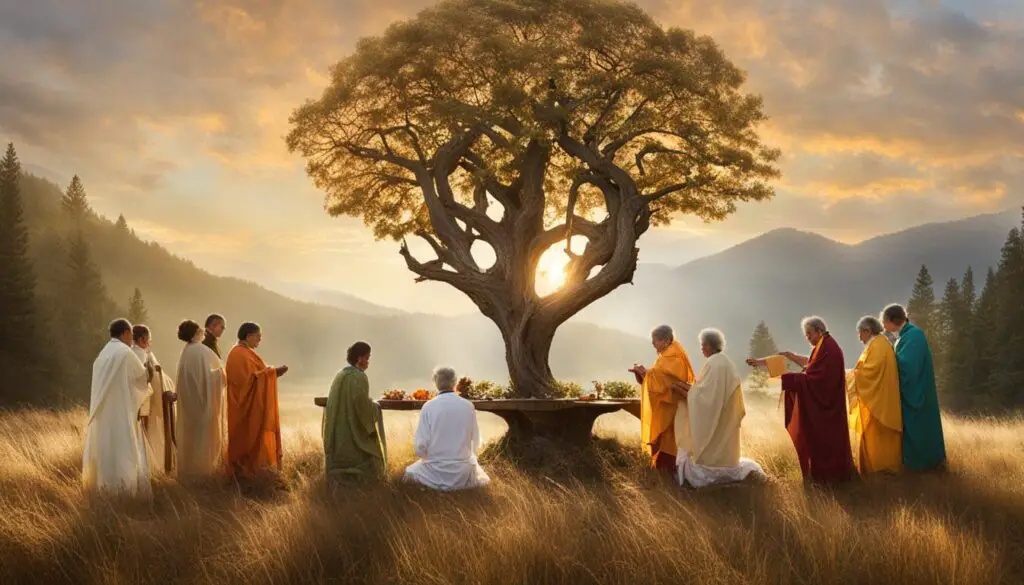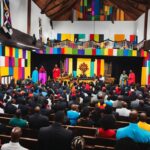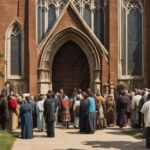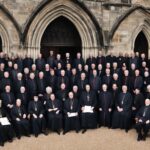The Unitarian Universalist Church, also known as the UU church, is a dynamic and inclusive religious tradition that has its roots in the consolidation of two historic denominations. This spiritual movement emerged in 1961 when the Universalist Church of America and the American Unitarian Association united to form the Unitarian Universalist Association (UUA).
Both Unitarianism and Universalism have long and rich histories that shaped the beliefs and values of the Unitarian Universalist Church. Unitarianism, originating in the late 18th century, emphasizes the unity of God and rejects the concept of the Holy Trinity. Universalism, which arose in the late 18th century as well, espouses the belief in universal salvation.
Unitarian Universalism is founded on the principles of intellectual freedom, individual spiritual exploration, and social justice. As a faith that celebrates diversity and inclusivity, it embraces people of various religious backgrounds and encourages them to seek truth and meaning in their own lives.
Key Takeaways:
- The Unitarian Universalist Church emerged in 1961 through the consolidation of the Universalist Church of America and the American Unitarian Association.
- Unitarianism focuses on the unity of God, rejecting the concept of the Holy Trinity.
- Universalism emphasizes universal salvation, asserting that all souls will be reconciled with God.
- Unitarian Universalism encourages individual spiritual exploration and the search for truth and meaning.
- The UU church is deeply committed to social justice and encourages diversity and inclusivity.
Origins of Unitarian Universalism
Unitarian Universalism, a progressive religious tradition, has its roots in the ancient Unitarian and Universalist traditions. These traditions have contributed significant theological concepts to the formation of Unitarian Universalism as it is known today.
Unitarian Belief:
The Unitarian belief rejects the Trinitarian notion of the tri-personal God and instead embraces the concept of a unitary God. Unitarianism acknowledges the divinity of Jesus but views him as a prophet rather than the second person of the Trinity. This rejection of the Trinity is based on a critical examination of early Christian texts and a search for a more rational understanding of God.
Universalist Belief:
Universalism, on the other hand, focuses on the belief in universal salvation. It asserts that all souls will ultimately be reconciled with God, emphasizing the unconditional love and mercy of God. Universalism finds its roots in the early Christian church and gained prominence in the United States during the 18th and 19th centuries.
These two traditions began to integrate and collaborate in the early 20th century, leading to the formation of the Unitarian Universalist Association (UUA) in 1961. This historic merger brought together Unitarians and Universalists, uniting their traditions and values into a single faith community.
The merger of Unitarianism and Universalism into Unitarian Universalism symbolizes the coming together of diverse beliefs and the shared commitment to social justice, inclusivity, and the celebration of human diversity.
Beliefs and Doctrines of Unitarian Universalism
Unitarian Universalism is a faith tradition that embraces a diversity of beliefs and encourages a free and responsible search for truth and meaning. Unlike other religious traditions, the Unitarian Universalist Church does not adhere to a specific creed or dogma. Instead, it is united by a common commitment to spiritual growth, ethical living, and the pursuit of justice and compassion.
Unitarian Universalists draw inspiration from a wide range of sources, including:
- Personal experience: Individuals are encouraged to reflect on their own experiences and insights, seeking wisdom and guidance from within.
- Prophetic utterances: Unitarian Universalists are inspired by the words and actions of prophets, visionaries, and leaders who have championed justice and equality throughout history.
- World religions: The teachings and practices of various religious traditions, such as Buddhism, Hinduism, Judaism, Islam, Christianity, and more, are respected and studied for their insights and wisdom.
- Jewish and Christian teachings: Unitarian Universalists value the wisdom found in the Jewish and Christian traditions, drawing from the Bible and other sacred texts.
- Humanist teachings: Many Unitarian Universalists are influenced by humanist principles, emphasizing reason, ethics, and the inherent worth and dignity of every human being.
- Spiritual teachings: Unitarian Universalism embraces a wide range of spiritual practices and teachings, including meditation, mindfulness, and the exploration of metaphysical questions.
The beliefs of individual Unitarian Universalists can vary widely, reflecting the diverse backgrounds and experiences of its members. Some may identify as religious humanists, emphasizing the beauty and potential of the human spirit. Others may embrace Christian teachings, finding inspiration in the life and teachings of Jesus. Still, others may identify as atheists or agnostics, focusing on reason and the scientific exploration of the world.
“Unitarian Universalism is not about finding all the answers; it’s about asking the right questions.”
In Unitarian Universalism, freedom of belief is celebrated, and individuals are encouraged to engage in an ongoing exploration of truth and meaning. It is a faith that welcomes diversity, fosters deep connection and engagement, and encourages each individual to find their own path towards a fulfilling and purposeful life.

Key Principles of Unitarian Universalism
While Unitarian Universalism does not adhere to a strict set of doctrines, the Unitarian Universalist Association (UUA) has articulated seven principles that provide a guiding framework for the faith:
- The inherent worth and dignity of every person
- Justice, equity, and compassion in human relations
- Acceptance of one another and encouragement to spiritual growth
- A free and responsible search for truth and meaning
- The right of conscience and the use of the democratic process within congregations and in society at large
- The goal of world community with peace, liberty, and justice for all
- Respect for the interdependent web of all existence of which we are a part
These principles serve as a moral compass, guiding Unitarian Universalists in their interactions with others and in their service to the world. They emphasize the importance of inclusivity, justice, personal growth, and environmental stewardship. Through living out these principles, Unitarian Universalists strive to create a more compassionate, just, and sustainable world for all.
Sacraments and Rituals in Unitarian Universalism
Unitarian Universalism, as a liberal religious tradition, emphasizes meaningful rituals that reflect the values and beliefs of individuals and communities within the congregation. While sacraments in the traditional sense do not exist within the Unitarian Universalist church, diverse rituals are embraced to celebrate important life events and foster a sense of connection and shared experience.

These rituals can encompass a wide range of ceremonies and celebrations, tailored to meet the needs and preferences of congregants. Some common rituals in Unitarian Universalism include:
-
Child Dedications: Symbolic ceremonies that welcome children into the community and express the congregation’s commitment to supporting their spiritual growth and development.
-
Coming-of-Age Ceremonies: Rites of passage that mark the transition from childhood to young adulthood, providing space for self-reflection, exploration of personal beliefs, and a deeper understanding of Unitarian Universalist values.
-
Marriage Ceremonies: Thoughtfully designed ceremonies that celebrate the union of two individuals and uphold the principles of love, commitment, and equality.
-
Memorial Services: Rituals of remembrance that honor the lives of those who have passed away, offering comfort, support, and an opportunity to celebrate their legacies.
Furthermore, congregations may incorporate additional rituals and practices based on their unique traditions and community needs.
Unitarian Universalist rituals are characterized by inclusivity, providing opportunities for personal expression and spiritual exploration. These ceremonies are designed to foster a sense of belonging, honor significant life events, and create sacred spaces for reflection, connection, and celebration.
Leadership and Clergy in Unitarian Universalism
The Unitarian Universalist Church values strong leadership and encourages the active participation of its members in decision-making. While ministers play a central role in guiding congregations, the structure of leadership can vary from one UU church to another.
Most Unitarian Universalist congregations are led by ministers who have completed seminary training and have been ordained. These ministers provide spiritual guidance, pastoral care, and support to the congregation. They often deliver sermons, lead worship services, and facilitate religious education programs. Their role is crucial in fostering the spiritual growth and well-being of the community.
However, it is important to note that some UU churches may also rely on lay leaders or shared ministry models. Lay leaders, who may or may not have formal religious training, contribute their skills and expertise to the congregation. They may lead worship services, facilitate small group discussions, or engage in social justice work. Shared ministry models involve a collaborative approach to leadership, with multiple individuals taking on different responsibilities within the congregation.
Unitarian Universalism values congregational democracy, which means that decisions within the church are made collectively and with the input of all members. This participatory approach ensures that the voices and perspectives of the entire community are heard and respected.
As a result, Unitarian Universalism offers a dynamic and inclusive leadership structure that reflects the shared values and beliefs of the congregation.
Key Points
- Most Unitarian Universalist congregations are led by ordained ministers.
- Some congregations may also rely on lay leaders or shared ministry models.
- Unitarian Universalism values congregational democracy and the active participation of all members in decision-making.

| Leadership Model | Description |
|---|---|
| Ministerial Leadership | Ordained ministers provide spiritual guidance, pastoral care, and support to the congregation. |
| Lay Leadership | Lay leaders, with or without formal religious training, contribute their skills and expertise to the congregation. |
| Shared Ministry | A collaborative approach to leadership, with multiple individuals taking on different responsibilities within the congregation. |
Worship Practices in Unitarian Universalism
Worship in the Unitarian Universalist Church is a vibrant and diverse experience that reflects the inclusive nature of the faith. Each congregation has the freedom to create its own worship services, tailoring them to the needs and preferences of its members. This flexibility allows for a rich tapestry of worship practices within the Unitarian Universalist community.
The worship services often include a blend of elements from various religious traditions, emphasizing the shared values of love, justice, and compassion. Music plays a vital role in Unitarian Universalist worship, with congregations singing hymns and spiritual songs that inspire and uplift. Prayer and meditation are also common practices, providing moments of reflection and connection with the divine.
Readings and reflections from a wide range of sources are incorporated into worship services, including sacred texts, poetry, and literature. These diverse readings offer spiritual nourishment and encourage deeper contemplation of the human experience. Unitarian Universalists also value intellectual exploration and may engage in thoughtful discussions during worship services.
Unitarian Universalist worship services are designed to engage the mind and the spirit, creating spaces for personal growth and shared community. The goal is to create inclusive and meaningful worship experiences that inspire and uplift congregants, fostering a sense of connection and belonging.

“In worship we are united, and in love we practice our faith. Through our shared experiences, we find inspiration, solace, and joy, as we honor the diversity of our beliefs and the interconnectedness of all beings.”
Sacred Texts in Unitarian Universalism
Unitarian Universalism is a religious tradition that embraces a diverse array of sources for inspiration and guidance. Unlike many other religious traditions, Unitarian Universalism does not have a specific set of sacred texts that its adherents must follow. Instead, Unitarian Universalists draw wisdom from a variety of sources, allowing for individual exploration and interpretation.
Unitarian Universalists believe in the power of personal reflection and the importance of seeking truth and meaning in one’s own life. This emphasis on individual exploration extends to the realm of sacred texts, where Unitarian Universalists are encouraged to engage with a wide range of sources to deepen their spiritual understanding.
Unitarian Universalists often find inspiration in the wisdom literature of different cultures and traditions. Texts such as the poetry of Rumi, the Bhagavad Gita, the Tao Te Ching, and the works of Ralph Waldo Emerson have all influenced Unitarian Universalist thought.
Many Unitarian Universalists also draw from the teachings of various religious traditions, including Judaism, Christianity, and Buddhism. By exploring different religious texts, Unitarian Universalists gain a broader perspective and insight into the universal truths that these traditions impart.
“Unitarian Universalism affirms and promotes the spiritual teachings of all religions, which inspire us in our ethical and spiritual life…”
-Unitarian Universalist Association
Contemporary writings and the works of philosophers, thinkers, and scholars also hold significance for Unitarian Universalists. By engaging with the ideas and perspectives of contemporary authors, Unitarian Universalists can stay informed on current issues and apply these insights to their spiritual practices.
Unitarian Universalism is a religion that values intellectual curiosity, spiritual exploration, and the free search for truth and meaning. By embracing a diverse range of sacred texts, Unitarian Universalists create a rich tapestry of wisdom that helps guide their individual and collective spiritual journeys.

Denominations and Sects within Unitarian Universalism
Unitarian Universalism is a vibrant and diverse religious movement that encompasses various denominations and sects. While the Unitarian Universalist Association (UUA) serves as the largest organization of Unitarian Universalist congregations, there are other groups within the faith that share similar beliefs and practices. These denominations and sects provide unique expressions of Unitarian Universalist principles and cater to diverse spiritual needs. Some notable denominations and sects within Unitarian Universalism include:
- The Unitarian Universalist Christian Fellowship (UUCF): Founded in 1945, the UUCF focuses on integrating Christian teachings and traditions with Unitarian Universalism. It provides a spiritual home for those who embrace Christian beliefs and values while also valuing the principles of inclusivity and social justice.
- The Unitarian Universalist Buddhist Fellowship (UUBF): The UUBF is a community of Unitarian Universalist Buddhists who combine the teachings and practices of Buddhism with the principles of Unitarian Universalism. It offers a space for individuals seeking spiritual growth through Buddhist meditation, mindfulness, and compassionate action.
- The Humanist Association of Unitarian Universalists (HUU): The HUU represents Unitarian Universalists who identify as humanists, emphasizing reason, science, and ethical values. It welcomes individuals who approach spirituality from a secular perspective and seek meaning and purpose through human experience and human-centered ethics.
These denominations and sects within Unitarian Universalism provide enriching and diverse paths for spiritual exploration and growth. They reflect the inclusive and adaptable nature of Unitarian Universalism, embracing a wide range of beliefs and practices while remaining united in the pursuit of justice, compassion, and spiritual fulfillment.
| Denomination/Sect | Foundation Year | Main Focus |
|---|---|---|
| Unitarian Universalist Christian Fellowship (UUCF) | 1945 | Integration of Christian teachings and Unitarian Universalist principles |
| Unitarian Universalist Buddhist Fellowship (UUBF) | 1988 | Integration of Buddhist practices and Unitarian Universalist principles |
| Humanist Association of Unitarian Universalists (HUU) | 1992 | Promotion of human-centered ethics and reason within Unitarian Universalism |
Community and Outreach in Unitarian Universalism
Unitarian Universalism is a vibrant and inclusive religious tradition that places a strong emphasis on community and outreach. Unitarian Universalist congregations are committed to making a positive impact in the world by engaging in social justice work and promoting equality, justice, and compassion in their communities and beyond.
One of the key principles of Unitarian Universalism is the belief in the inherent worth and dignity of every individual. This principle is at the heart of community building and outreach efforts within Unitarian Universalist congregations. Through various initiatives, congregations aim to create a welcoming and inclusive space where individuals from all walks of life can come together in fellowship and support.
Many Unitarian Universalist congregations actively engage in social justice work, addressing issues such as racial justice, LGBTQ+ rights, climate change, poverty, and immigration. This commitment to social justice stems from the belief that as Unitarian Universalists, it is our responsibility to work towards creating a more just and compassionate world.
Unitarian Universalist congregations also provide opportunities for community building and fellowship. Through gatherings, events, and initiatives, members of the congregation can connect with one another, form meaningful relationships, and support each other on their spiritual journeys. These communities serve as a source of inspiration, encouragement, and support for individuals and families.
“If we are to have peace on Earth, our loyalties must become ecumenical rather than sectional. Our loyalties must transcend our race, our tribe, our class, and our nation; and this means we must develop a world perspective.” – Rev. Dr. Martin Luther King Jr.
Community Outreach Programs
Unitarian Universalist congregations actively engage in a wide range of community outreach programs that aim to address the needs of the broader community. These programs may include:
- Food drives and support for local food banks
- Homelessness prevention initiatives
- Environmental sustainability projects
- Youth mentoring programs
- Immigration advocacy and support
- Interfaith collaborations
- Partnerships with local organizations and nonprofits
Through these outreach efforts, Unitarian Universalists seek to make a tangible difference in the lives of individuals and communities. By working together, Unitarian Universalists strive to create a world that is more just, compassionate, and inclusive.
Unitarian Universalism is not just a religious belief system; it is a call to action. It is an invitation to come together, support one another, and work towards creating a better world. Community and outreach are integral to the Unitarian Universalist experience, providing opportunities for connection, growth, and making a positive impact in the world.
Contemporary Issues and Challenges in Unitarian Universalism
Unitarian Universalism, like every religious movement, faces its own set of contemporary issues and challenges as it seeks to navigate the complexities of the modern world. One challenge lies in finding the delicate balance between individual beliefs and the desire for a strong and vibrant community. Unitarian Universalists celebrate the diversity of beliefs within their congregations, but this can also give rise to tensions and conflicts.
Another pressing challenge is the need to address issues of diversity and inclusion within the movement. While Unitarian Universalism values and promotes inclusivity, there is still work to be done to ensure that all individuals are truly welcomed and affirmed in their identities and experiences. The movement is actively engaging in conversations and initiatives to create more inclusive spaces for marginalized groups.
The changing religious landscape also presents a challenge for Unitarian Universalism. As traditional religious institutions decline in influence, there is a need to adapt and stay relevant in a rapidly evolving society. Unitarian Universalist congregations are exploring new ways of engaging with spirituality and religion, embracing innovative worship practices, and reaching out to the wider community to build connections and relevance.
Despite these challenges, Unitarian Universalism remains a resilient and adaptive movement. With a commitment to social justice, a dedication to individual spiritual exploration, and a belief in the inherent worth and dignity of all people, Unitarian Universalist congregations continue to tackle these contemporary issues head-on. By engaging in thoughtful dialogue, nurturing inclusive spaces, and embracing change, Unitarian Universalism seeks to address these challenges and forge a path forward that is true to its principles and values.
FAQ
What is the history of the Unitarian Universalist Church?
The Unitarian Universalist Church emerged in 1961 from the consolidation of two denominations, Unitarianism and Universalism. The Universalist Church of America was founded in 1793, while the American Unitarian Association was established in 1825. These faiths merged to form the Unitarian Universalist Association (UUA), which has since been a strong advocate for social justice and liberal religion.
What are the origins of Unitarian Universalism?
Unitarian Universalism traces its origins to the Unitarian and Universalist traditions, which have contributed important theological concepts to the faith. Unitarianism rejects the Trinitarian belief in the tri-personal God and asserts a unitary notion of God. Universalism believes in universal salvation, asserting that all souls will be reconciled with God. These traditions came together in 1961 to form Unitarian Universalism through the UUA.
What are the beliefs and doctrines of Unitarian Universalism?
Unitarian Universalism is characterized by a “free and responsible search for truth and meaning” and does not adhere to a specific creed. Instead, it is unified by the shared search for spiritual growth. Unitarian Universalists draw inspiration from various sources, including personal experience, prophetic utterances, world religions, Jewish and Christian teachings, humanist teachings, and spiritual teachings. The beliefs of individual Unitarian Universalists can vary widely, ranging from religious humanism to Christianity to atheism.
What are the sacraments and rituals in Unitarian Universalism?
Unitarian Universalism does not have sacraments in the traditional sense, but instead focuses on rituals that are meaningful to individuals and communities. These rituals can vary widely and may include child dedications, coming-of-age ceremonies, marriage ceremonies, and memorial services. The emphasis is on creating meaningful, inclusive rituals that reflect the values and beliefs of the congregation.
Who are the leaders and clergy in Unitarian Universalism?
Unitarian Universalist congregations are typically led by ministers who have completed seminary training and have been ordained. However, the structure of leadership can vary among congregations. Some congregations have multiple ministers, while others may rely on lay leaders or shared ministry models. Unitarian Universalism also values the participation of all members in decision-making and encourages congregational democracy.
What are the worship practices in Unitarian Universalism?
Worship in Unitarian Universalism is diverse and can vary among congregations. It often includes elements such as music, prayer, meditation, readings, and reflections. Unitarian Universalist worship services may draw inspiration from various religious traditions and can be tailored to meet the needs and preferences of the congregation. The goal is to create inclusive, meaningful worship experiences that engage the mind and spirit.
What are the sacred texts in Unitarian Universalism?
Unitarian Universalism does not have an official, unified corpus of sacred texts. Instead, Unitarian Universalists draw inspiration and guidance from a wide range of sources, including personal reflection, wisdom literature, religious texts from different traditions, and contemporary writings. The emphasis is on the individual’s search for meaning and truth, rather than adherence to a specific set of texts.
What are the denominations and sects within Unitarian Universalism?
Unitarian Universalism is not a monolithic entity, but rather a diverse movement that encompasses various denominations and sects. While the Unitarian Universalist Association is the largest organization of Unitarian Universalist congregations, there are other denominations and sects that share similar beliefs and practices. These include the Unitarian Universalist Christian Fellowship, the Unitarian Universalist Buddhist Fellowship, and the Humanist Association of Unitarian Universalists.
What is the focus on community and outreach in Unitarian Universalism?
Unitarian Universalism places a strong emphasis on community and outreach. Many congregations engage in social justice work and actively work towards promoting equality, justice, and compassion in the wider world. Unitarian Universalist congregations also provide opportunities for community building, fellowship, and support for members and the broader community.
What are the contemporary issues and challenges in Unitarian Universalism?
Unitarian Universalism faces a variety of contemporary issues and challenges, such as navigating tensions between individual beliefs and the desire for community, addressing issues of diversity and inclusion within the movement, and grappling with the changing landscape of religion in the modern world. Unitarian Universalist congregations are continually seeking to address these challenges and adapt to the needs and concerns of their members and society as a whole.
















